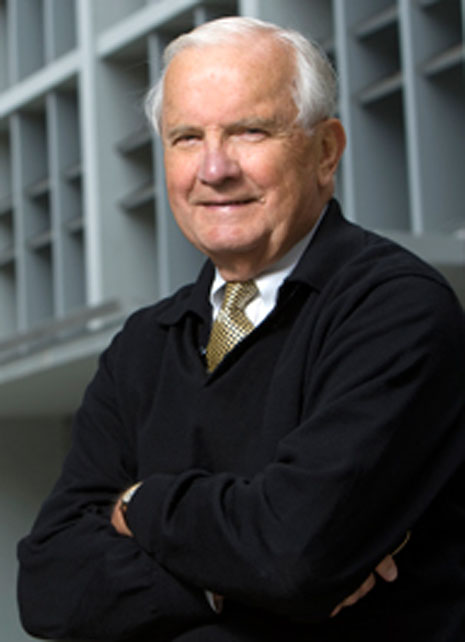FAYETTEVILLE, Ark. – The abundance of readily available, electronically stored information on Facebook has upended traditional notions of professionalism, civil discovery and criminal law enforcement. The Arkansas Law Review will host a symposium on the changes to the legal landscape caused by Facebook and other forms of social media. The symposium will begin at 11:30 a.m. Friday, Nov. 4, in the E.J. Ball Courtroom of Leflar Law Center at the University of Arkansas. The event is free, open to the public, and will offer 4.5 hours of continuing legal education credit free of charge to practitioners, including 1.5 hours of ethics credit.
Geoffrey C. Hazard Jr., perhaps the most celebrated figure in legal ethics today, will give the opening presentation of the symposium. Hazard’s remarks will focus on the practical role that professional legal ethics play in the world of social media, particularly Facebook, and will qualify for 1.5 hours of ethics continuing legal education.
Hazard, the Thomas E. Miller Distinguished Professor of Law at the University of California Hastings College of Law, served as director of the American Law Institute, the nation’s most important and influential law reform organization, from 1984 to 1999. His casebook, Law and Ethics of Lawyering, is a mainstay of American legal education. He produced the ALI/UNIDROIT Principles of Transnational Civil Procedure, which has become a model of civil procedure for international commercial disputes. Hazard also serves as Trustee Professor of Law, emeritus, at the University of Pennsylvania Law School and Sterling Professor Emeritus of Law at Yale Law School.
“The outstanding law students who publish the Arkansas Law Review are in tune with emerging issues in the legal community, as evidenced by this symposium on Facebook’s impact on the law,” said Stacy L. Leeds, dean of the School of Law. “That Geoffrey Hazard is giving the Wylie H. Davis Distinguished Lecture to kick off the symposium is exciting. The School of Law is attracting in the foremost authorities to address the issues of the day.”
At 1:45 p.m., a panel will consider the criminal procedure issues confronting Facebook. Issues to be discussed include whether officers perform a Fourth Amendment search when they access electronically stored information contained in a Facebook profile and whether an accused person may invoke the Fifth Amendment to avoid disclosing his Facebook password to officers. The panel will be moderated by Brian Gallini, assistant professor of law at the University of Arkansas, and will include Jeffrey Bellin, assistant professor at Southern Methodist University Dedman School of Law; Caren Morrison, assistant professor at Georgia State University School of Law; and Junichi P. Semitsu, professor in residence at University of San Diego School of Law. The criminal law panel presentation will qualify for 1.5 hours of general continuing legal education.
At 3:30 p.m., the civil litigation panel will tackle “More Than Just ‘Likes’ and ‘Friends’: The Impact of Social Media on Civil Litigation.” The panel will consider such questions as whether new discovery rules should be adopted for the realm of social media and what advantage increased access to online information provides for attorneys practicing today? The panel will be moderated by Dustin Buehler, assistant professor of law at the University of Arkansas, and will include Bruce E. Boyden, assistant professor at Marquette University Law School; Steven S. Gensler, the Welcome D. and W. DeVier Pierson Professor of Law at the University of Oklahoma College of Law; and Cassandra Burke Roberston, associate professor at Case Western Reserve University School of Law. The civil litigation panel discussion will qualify for 1.5 hours of general continuing legal education.
Contacts
Andy Albertson, director of communications
Research and Economic Development
479-575-6111,
